John Otis
John Otis, CPJ's Andes correspondent for the Americas program, works as a reporter for NPR. He authored the 2010 book Law of the Jungle about U.S. military contractors kidnapped by Colombian rebels. He is based in Bogotá, Colombia

Ecuador loses investigative journal Vanguardia
Like the death of a loved one. That’s how Juan Carlos Calderón, editor of the newsmagazine Vanguardia, described the June 28 closing of the newsweekly that for eight years published hard-hitting investigations about public officials and faced frequent government harassment. Yet the final days of Vanguardia were almost as controversial as its stories.
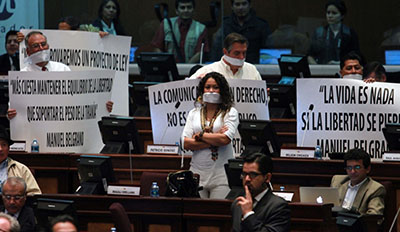
New Ecuadoran legislation seen as a gag on critics
After inspecting a hydroelectric project in northern Ecuador last year, President Rafael Correa complained about the scant press coverage of his visit and suggested it was part of a media blackout. “Did the Ecuadoran media conspire to ignore this important event? It seems like that is the case,” Correa told the crowd at a town…

Globovisión quickly eases combative stance after sale
That didn’t take long. Nine days after the pro-opposition TV station Globovisión was sold to businessmen rumored to have close ties to the Venezuelan government, the station’s new leader was welcomed to Miraflores Palace for a cordial sit-down with President Nicolás Maduro.
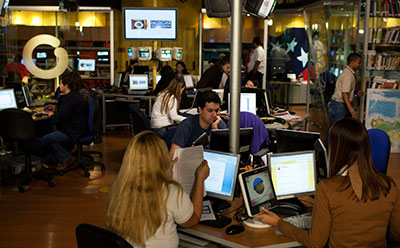
Globovisión sale would finish critical Venezuelan TV
If the proposed sale of Globovisión, the single remaining TV station critical of the Venezuelan government, is finalized next month, the broadcaster will almost certainly become less combative and could eventually turn into another government mouthpiece, according to news reports, local journalists, and analysts.
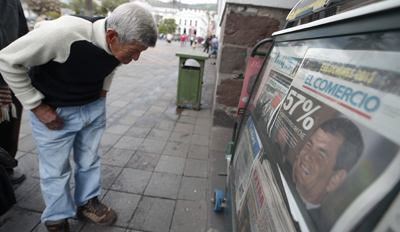
Battle between Correa, Ecuadoran press to wage on
In the wake of President Rafael Correa’s landslide re-election on Sunday, many Ecuadoran reporters are bracing for another four years of conflict with his left-leaning government. Neither side claims to relish the prospect, but continued clashes seem inevitable given the bad blood that has developed between them.
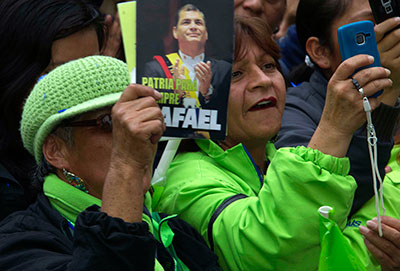
Electoral law dulls reporting as Correa nears re-election
It’s by far the dullest space in the newspaper: Every day in El Universo, Ecuador’s leading daily, readers can find eight small photos and news blurbs summing up the activities of the eight presidential candidates. The articles are the same size and blocked together in a layout that resembles a tic-tac-toe game, minus the ninth…
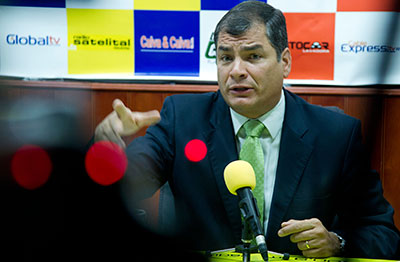
In Correa’s Ecuador, a bulletin on breakfast is routine
On September 11, 2012, the Ecuadoran government interrupted a morning newscast on the Teleamazonas TV station for an official bulletin. What could be so urgent? A coup d’etat? An earthquake? A cholera outbreak? It turned out the government sought to clarify what President Rafael Correa had for breakfast.
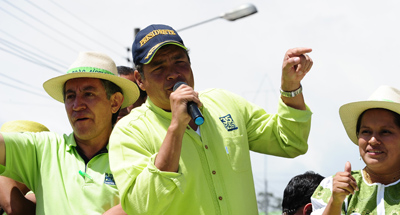
Repression deepens as Correa heads to new term
One result of President Rafael Correa’s high-profile campaign to demonize the country’s private media can be seen on the desk of José Velásquez, news manager at Teleamazonas, a private Quito television station often critical of the government. Among the documents piled high on his desk are lawsuits, which used to be a rare thing. Encouraged by…

Amid violence, lack of unity among Honduran journalists
On May 25, the Honduran press corps took to the streets of Tegucigalpa and four other cities to reject the growing levels of violence against members of the media. Many marchers donned yellow-and-black t-shirts emblazoned with the words: “Killing journalists will not kill the truth.”
